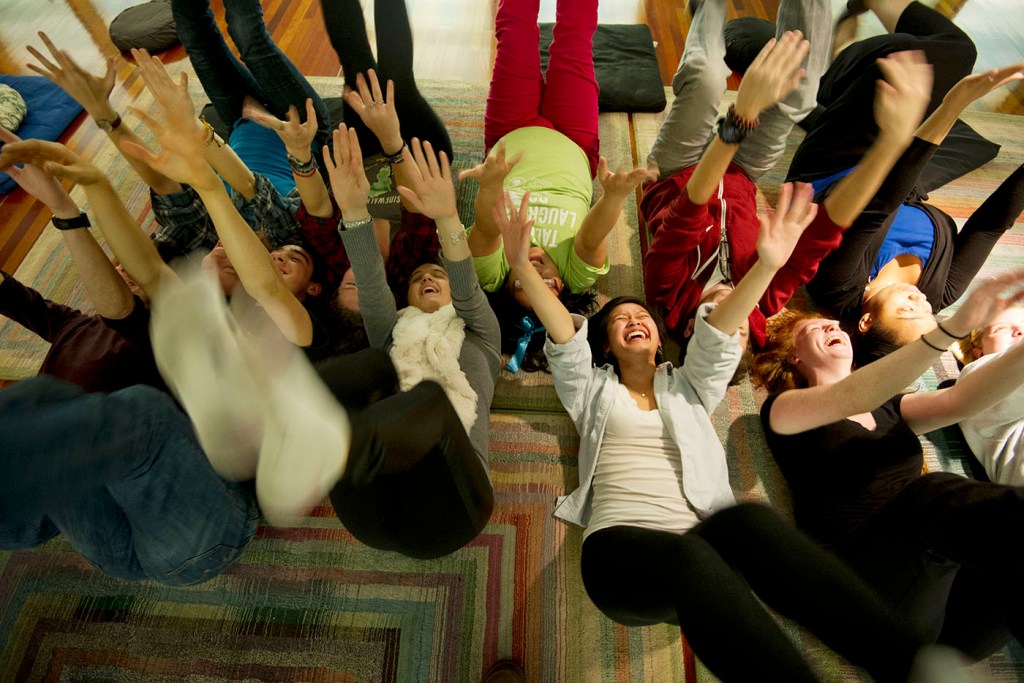Laughing Matters

On a recent Friday afternoon, a small group of Northeastern students convened in the Sacred Space to rekindle the lost joys of childhood.
They assembled in the name of laughter meditation, sticking out their tongues, talking in gibberish, and lolling on dusky mats.
“Do I have to take off my shoes?” asks one first-timer, as she ambles into the dimly lit room before the fun begins.
“You don’t have to,” says Dan Arias, the group’s guru, “but you might be more comfy if you do.”
Arias, S’15, is wearing a pair of black pajamas dotted with tie-dyed peace signs. As an icebreaking game, he reveals a funny fact about his sartorial ensemble: “I’m Dan and I have the longest socks in the room,” he says, hiking up his pajamas to disclose black knee-highs.
Others follow suit, revealing the idiosyncrasies of their habits and behaviors. “Whenever I refer to the human race, I say ‘human beans,’” says Moleca Mich, PhD’15. “It reminds me not to take life too seriously.”
“Sometimes I call my cat ‘beans,’” shouts Lauren Olean, apropos of Mich’s quirky custom. The most enthusiastic attendee, Olean, SSH’14, is clad in velvet pajamas, incongruously patched with deep browns and blues. Later this month, she plans to move to Costa Rica to work for a collective farm.
After intros, the formal exercises begin. Arias, who’s led a handful of the Center for Spirituality, Dialogue, and Service’s weekly laughter meditations since the start of his freshman year, prompts his disciples to inhale and exhale while sticking out their tongues like lions. Then he tells them to make lion ears with their hands while laughing without restraint, noting that it “helps so much to really let your tongue out.”
The silly games—respectively dubbed the “lion’s breath” and the “lion’s laugh”—align with the scientific belief that laughing matters. According to the Mayo Clinic, laughing improves your immune system, relieves pain, and helps you connect with other people.
Of the after effects of laughter meditation, Mich says, “I feel like I’ve been cleansed. If I’m stressed, I feel like I’ve gotten something out of my system.” Adds Arias: “You feel like a kid and start to think there is something to this child-like way of living.”
For another exercise, Arias commands his students to speak in complete gibberish. He says, “I don’t want to hear any words that I’ve ever heard before,” and they comply, drawing belly laughs from spectators: “Shib a bob a boo a doo.”
Later, Mich and two newcomers team up to battle Arias, Olean, and Adriana Gutierrez, DMSB’16, in a one-of-a-kind laughter “debate” over nothing in particular. “We’ll see if we can convince you with our laughter,” Arias tells his opponents, “and then you’ll offer your rebuttal.”
“Ha-hahahahahahahaha-ha-ha-ha,” Olean intones, arguing on behalf of her team.
“Now,” Arias tells his opponents, “it’s your turn to see if you can prove us wrong.”
“Haaah-ha-hahahaha-haha,” Mich bellows.
“Very good,” Arias tells the group. “Any last words?”
“Who-who-who-ha-ha-ha.”
To end the meditation, the attendees huddle in the middle of the Sacred Space like football players. They work as a team, building an imaginary “laughter snowball” and then tossing the sphere into the air.
“Send it to someone who needs a little lightness,” Arias says. “How wonderful would it be if everyone experienced happiness?”





